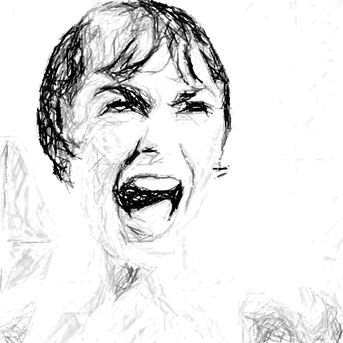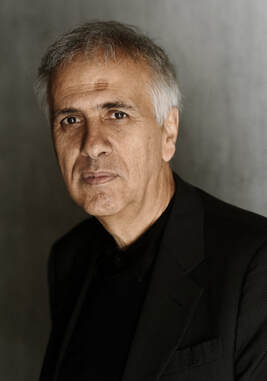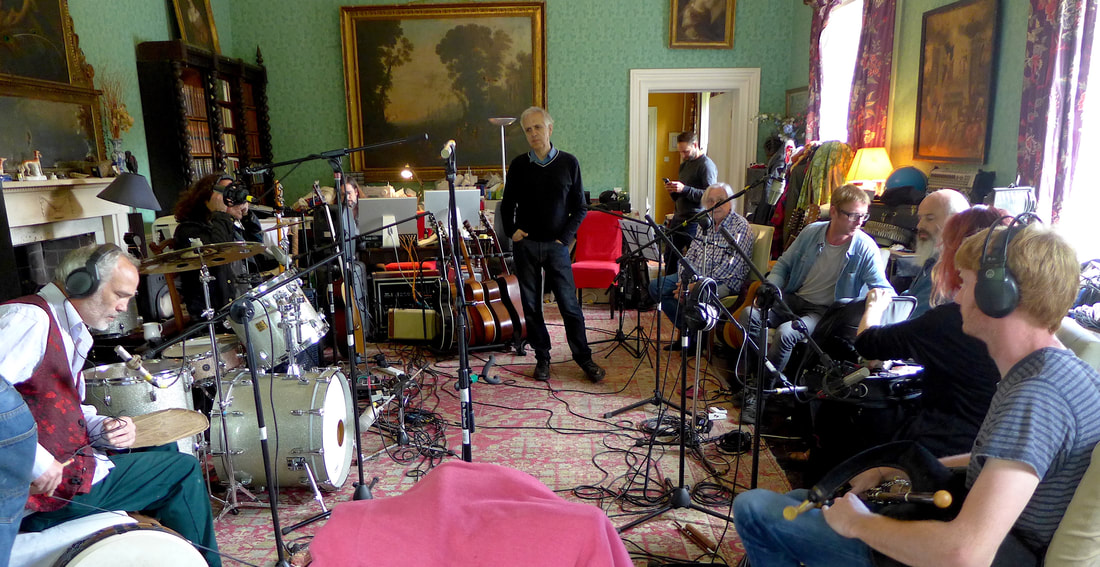BRUNO COULAIS
|
« Au cinéma, le compositeur doit aller à la rencontre des cinéastes, entrer dans leur monde, mais sans renoncer au sien propre. Voilà la difficulté ou le paradoxe de la musique pour l’image. En collaborant avec des réalisateurs et réalisatrices aux univers très variés, je pense avoir découvert par ricochet beaucoup de choses sur moi-même. Cela m’a aidé à progresser, à explorer des territoires qui n’étaient pas naturellement les miens. Le Cinéma est un laboratoire où j’ai cherché à construire des formules orchestrales inédites alliant à la fois des polyphonies corses, des musiciens issus du jazz, de la variété, du classique, ou même des rappeurs. A l’image du monde d’aujourd’hui, un monde éclaté où se mêlent toutes les cultures. » Ainsi s’exprimait Bruno Coulais, un des compositeurs les plus innovants du cinéma contemporain lors de l’hommage qui lui était rendu en 2011 à la Cinémathèque de Paris
En 1978, Bruno Coulais, jeune compositeur d’œuvres de concert, découvre dans la musique de film un nouveau moyen d’expression, une façon d’amener l’exigence de son écriture vers le plus grand nombre. François Reichenbach, puis Josée Dayan, Jacques Davila, Souleymane Cissé ou Laurent Heynemann, d’abord à la télévision puis au cinéma, l’entrainent de son plein gré dans la découverte de ce nouveau monde. En 1995, il compose la musique de Microcosmos. Ce voyage initiatique à l’échelle du centimètre lui offre l’opportunité de révéler la pleine dimension de son écriture. Il injecte dans sa partition un étrange lyrisme, entre émerveillement et fantastique, confirmant la leçon apprise auprès de François Reichenbach : "À toute image documentaire, la musique apporte une part de fiction". Le succès de Microcosmos consacre le musicien et fera de lui l’indispensable compositeur d’autres contes naturels aux côtés de Jacques Perrin réalisateur (Le Peuple Migrateur, Océans, Les Saisons …) et producteur (Himalaya l'Enfance d'un Chef ...). Outre les films d'auteur et quelques grands succès populaires tel Les Choristes, il n’est guère surprenant que cette curiosité insatiable ait su trouver dans le Cinéma d’Animation le plus inspirant des terrains de jeu, notamment à travers sa collaboration avec deux créateurs d’exception, Henry Selick et Tomm Moore. Le premier, réalisateur américain de L'Étrange Noël de Mr Jack produit par Tim Burton, invite Bruno Coulais à signer la magnifique partition de Coraline, nommé aux Oscars 2009. Dix ans plus tard, ils se retrouveront pour Wendell & Wild diffusé sur Netflix. Pour l’Irlandais Tomm Moore, Bruno Coulais a composé la musique de sa superbe trilogie irlandaise, The Secret of Kells (2009) , Song Of the Sea (2014), et Wolfwalkers (2020) trois films nommés aux Oscars. Quelque soit le projet, Bruno Coulais garde la même exigence, envisage toujours son art comme une fenêtre ouverte sur le monde. Bien moins sage qu’il n’y paraît, Il y révèle un don d’alchimiste moderne et une manière très personnelle de métisser les cultures les plus diverses en une harmonie universelle au travail. |
ENGLISH VERSION
"In cinema, the composer must enter into directors' world, but without giving up his own. This is the difficulty or paradox of music to image. By collaborating with filmmakers from a wide variety of backgrounds, by ricochet I think I have discovered a lot about myself. It helped me to progress, to explore territories that were not naturally mine. Cinema is a laboratory where I have sought to build new orchestral sets-up combining Corsican polyphonies, musicians from jazz, variety, classical, or even rappers. Like today's world, a fragmented world where all cultures mix." This is how Bruno Coulais, one of the most innovative composers of contemporary cinema, expressed himself during the tribute paid to him at the Cinémathèque de Paris.
In 1978, Bruno Coulais, young composer of concert works, discovered in film music an additional means of expression. A way of sharing with greatest number of people his writing demands. François Reichenbach, then Josée Dayan, Jacques Davila, Souleymane Cissé or Laurent Heynemann, first on television then in cinema, lead him into the discovery of this new world.
In 1995, he composed the music for Microcosmos. This initiatory journey on a centimetre scale is for him the perfect opportunity to reveal the full dimension of his writing. He injects into his score a strange lyricism, between wonder and fantasy, confirming the lesson learned from Reichenbach: to any documentary image, music brings a part of fiction.
The success of Microcosmos consecrates the musician and will make him the essential composer of other natural tales, notably alongside Jacques Perrin ( Le Peuple migrateur, Océans, Les Saisons, Himalaya...).
In addition to major popular hits such as Les Choristes, it is hardly surprising that this insatiable curiosity has found the most inspiring playground into animation cinema, particularly through its collaboration with two exceptional creators, Henry Selick and Tomm Moore.
The first, American director of The Nightmare Before Christmas produced by Tim Burton, invites Bruno Coulais to compose in 2009 the magnificent score of Coraline (Oscar nominated film). 10 years later, he is about to meet him again for a new and beautiful adventure Wendell & Wild. For Irish director Tomm Moore, Bruno Coulais has composed the music of 3 Oscar-nominated films : The Secret of Kells (2009), Song Of the Sea (2014) and Wolfwalkers in 2020.
Whether it is a question of auteur films or mainstream films, Bruno Coulais keeps the same high standards, always envisages his art as a window opens on the world. Much less wise than he seems, he reveals a gift of a modern alchemist and a very personal way of mixing the most diverse cultures in a universal harmony at work.
"In cinema, the composer must enter into directors' world, but without giving up his own. This is the difficulty or paradox of music to image. By collaborating with filmmakers from a wide variety of backgrounds, by ricochet I think I have discovered a lot about myself. It helped me to progress, to explore territories that were not naturally mine. Cinema is a laboratory where I have sought to build new orchestral sets-up combining Corsican polyphonies, musicians from jazz, variety, classical, or even rappers. Like today's world, a fragmented world where all cultures mix." This is how Bruno Coulais, one of the most innovative composers of contemporary cinema, expressed himself during the tribute paid to him at the Cinémathèque de Paris.
In 1978, Bruno Coulais, young composer of concert works, discovered in film music an additional means of expression. A way of sharing with greatest number of people his writing demands. François Reichenbach, then Josée Dayan, Jacques Davila, Souleymane Cissé or Laurent Heynemann, first on television then in cinema, lead him into the discovery of this new world.
In 1995, he composed the music for Microcosmos. This initiatory journey on a centimetre scale is for him the perfect opportunity to reveal the full dimension of his writing. He injects into his score a strange lyricism, between wonder and fantasy, confirming the lesson learned from Reichenbach: to any documentary image, music brings a part of fiction.
The success of Microcosmos consecrates the musician and will make him the essential composer of other natural tales, notably alongside Jacques Perrin ( Le Peuple migrateur, Océans, Les Saisons, Himalaya...).
In addition to major popular hits such as Les Choristes, it is hardly surprising that this insatiable curiosity has found the most inspiring playground into animation cinema, particularly through its collaboration with two exceptional creators, Henry Selick and Tomm Moore.
The first, American director of The Nightmare Before Christmas produced by Tim Burton, invites Bruno Coulais to compose in 2009 the magnificent score of Coraline (Oscar nominated film). 10 years later, he is about to meet him again for a new and beautiful adventure Wendell & Wild. For Irish director Tomm Moore, Bruno Coulais has composed the music of 3 Oscar-nominated films : The Secret of Kells (2009), Song Of the Sea (2014) and Wolfwalkers in 2020.
Whether it is a question of auteur films or mainstream films, Bruno Coulais keeps the same high standards, always envisages his art as a window opens on the world. Much less wise than he seems, he reveals a gift of a modern alchemist and a very personal way of mixing the most diverse cultures in a universal harmony at work.


